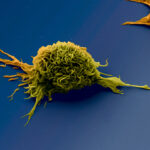Lien vers Pubmed [PMID] – 38036749
Lien DOI – 10.1038/s41556-023-01291-w
Nat Cell Biol 2023 Dec; 25(12): 1736-1745
Myeloid cell infiltration of solid tumours generally associates with poor patient prognosis and disease severity1-13. Therefore, understanding the regulation of myeloid cell differentiation during cancer is crucial to counteract their pro-tumourigenic role. Bone marrow (BM) haematopoiesis is a tightly regulated process for the production of all immune cells in accordance to tissue needs14. Myeloid cells differentiate during haematopoiesis from multipotent haematopoietic stem and progenitor cells (HSPCs)15-17. HSPCs can sense inflammatory signals from the periphery during infections18-21 or inflammatory disorders22-27. In these settings, HSPC expansion is associated with increased myeloid differentiation28,29. During carcinogenesis, the elevation of haematopoietic growth factors supports the expansion and differentiation of committed myeloid progenitors5,30. However, it is unclear whether cancer-related inflammation also triggers demand-adapted haematopoiesis at the level of multipotent HSPCs. In the BM, HSPCs reside within the haematopoietic niche which delivers HSC maintenance and differentiation cues31-35. Mesenchymal stem cells (MSCs) are a major cellular component of the BM niche and contribute to HSC homeostasis36-41. Modifications of MSCs in systemic disorders have been associated with HSC differentiation towards myeloid cells22,42. It is unknown if MSCs are regulated in the context of solid tumours and if their myeloid supportive activity is impacted by cancer-induced systemic changes. Here, using unbiased transcriptomic analysis and in situ imaging of HSCs and the BM niche during breast cancer, we show that both HSCs and MSCs are transcriptionally and spatially modified. We demonstrate that breast tumour can distantly remodel the cellular cross-talks in the BM niche leading to increased myelopoiesis.

